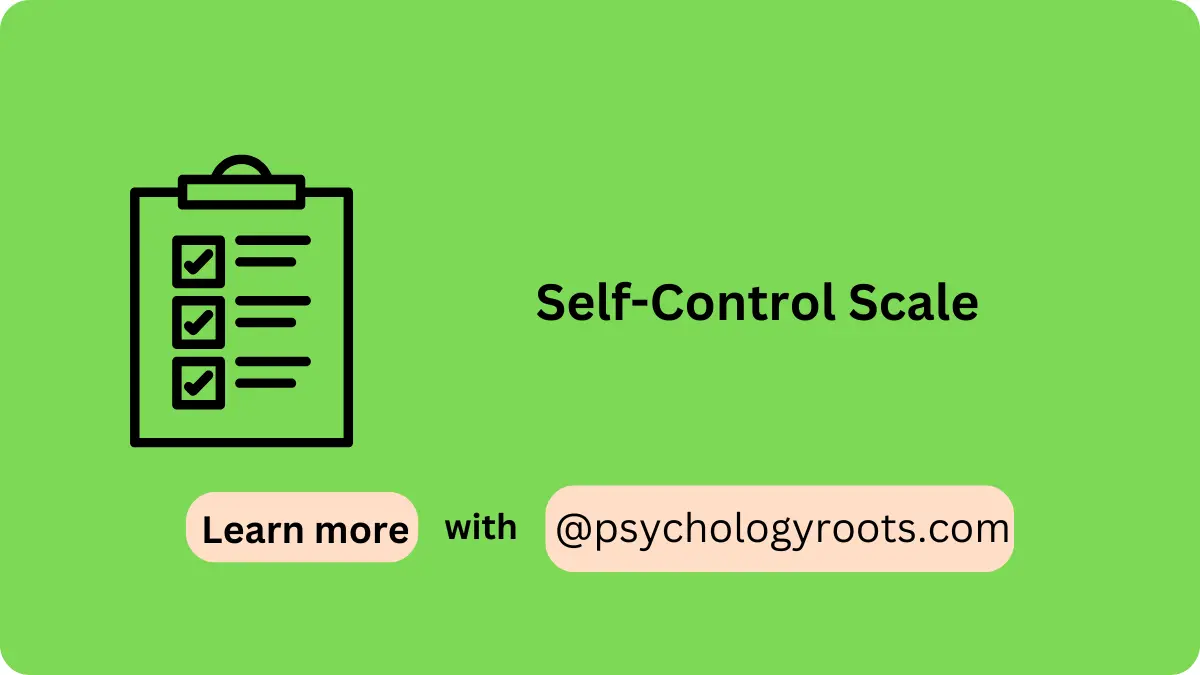Table of Contents
Self-Control Scale
Here in this post, we are sharing the “Self-Control Scale”. You can read psychometric and Author information. We have thousands of Scales and questionnaires in our collection (See Scales and Questionnaires). You can demand us any scale and questionnaires related to psychology through our community, and we will provide you with a short time. Keep visiting Psychology Roots.
About Self-Control Scale
Scale Name
Self-Control Scale
Author Details
June P. Tangney, Roy F. Baumeister, and Angie Luzio Boone
Translation Availability
English

Background/Description
The Self-Control Scale (SCS) is a comprehensive self-report instrument developed to assess individual differences in self-control, the capacity to regulate thoughts, emotions, and behaviors in alignment with long-term goals. Originally comprising 36 items, the SCS evaluates various facets of self-control, including impulse control, healthy habits, and goal attainment. A shorter, 13-item version known as the Brief Self-Control Scale (BSCS) was later developed to provide a more concise assessment while maintaining robust psychometric properties.
The SCS has been widely utilized in psychological research to explore the role of self-control in various life outcomes, such as academic achievement, interpersonal relationships, and mental health. Higher scores on the SCS are associated with better adjustment, fewer psychological issues, improved grades, and greater interpersonal success.
Administration, Scoring and Interpretation
- Obtain a Copy: Acquire the Self-Control Scale from authorized academic publications or psychological assessment resources.
- Explain the Purpose: Inform participants that the SCS measures their typical self-control behaviors and is used for research or clinical purposes to understand self-regulation.
- Provide Instructions: Instruct participants to respond to each statement based on how much it reflects their typical behavior, using a Likert scale ranging from 1 (not at all like me) to 5 (very much like me).
- Approximate Time: Inform participants that the original 36-item version takes approximately 15–20 minutes to complete, while the 13-item BSCS requires about 5–10 minutes.
- Administer the Scale: Distribute the questionnaire in a quiet environment, ensuring participants can complete it without interruptions.
Reliability and Validity
The Self-Control Scale demonstrates high internal consistency, with Cronbach’s alpha coefficients typically above 0.85, indicating reliable measurement of the self-control construct. The scale’s validity is supported by significant correlations with various positive life outcomes, including academic performance, psychological adjustment, and interpersonal functioning. The BSCS maintains similar reliability and validity metrics, making it a suitable alternative when a shorter assessment is needed.
Available Versions
36-Items
Reference
Tangney, J. P., Boone, A. L., & Baumeister, R. F. (2018). High self-control predicts good adjustment, less pathology, better grades, and interpersonal success. In Self-regulation and self-control (pp. 173-212). Routledge.
Important Link
Scale File:
Frequently Asked Questions
What is the Self-Control Scale?
The Self-Control Scale is a self-report questionnaire designed to assess individual differences in self-control across various domains of life.
Who developed the Self-Control Scale?
The scale was developed by psychologists June P. Tangney, Roy F. Baumeister, and Angie Luzio Boone.
What is the difference between the original SCS and the Brief Self-Control Scale (BSCS)?
The original SCS consists of 36 items, while the BSCS is a shorter, 13-item version that provides a concise assessment of self-control.
How is the Self-Control Scale scored?
Participants rate items on a Likert scale from 1 to 5. Higher total scores indicate greater self-control.
In what contexts is the Self-Control Scale used?
The scale is used in research and clinical settings to study self-control’s impact on behaviors such as academic performance, health habits, and interpersonal relationships.
Disclaimer
Please note that Psychology Roots does not have the right to grant permission for the use of any psychological scales or assessments listed on its website. To use any scale or assessment, you must obtain permission directly from the author or translator of the tool. Psychology Roots provides information about various tools and their administration procedures, but it is your responsibility to obtain proper permissions before using any scale or assessment. If you need further information about an author’s contact details, please submit a query to the Psychology Roots team.
Help Us Improve This Article
Have you discovered an inaccuracy? We put out great effort to give accurate and scientifically trustworthy information to our readers. Please notify us if you discover any typographical or grammatical errors.
Make a comment. We acknowledge and appreciate your efforts.
Share With Us
If you have any scale or any material related to psychology kindly share it with us at psychologyroots@gmail.com. We help others on behalf of you.